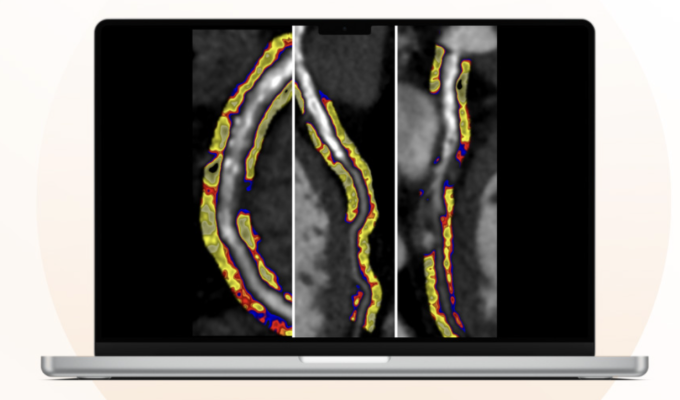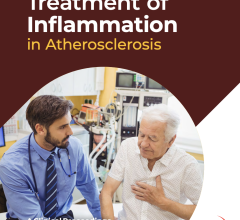
Caristo Diagnostics Limited has announced the results of a landmark clinical study published in The Lancet that support the ability of Caristo's CaRi-Heart AI technology to quantify coronary artery inflammation and accurately predict cardiac events. Image courtesy: Caristo Diagnostics
June 4, 2024 — Caristo Diagnostics Limited, a global provider of cardiovascular disease diagnostics and risk prediction, has announced the results of a landmark clinical study published May 30 in The Lancet that support the ability of Caristo's CaRi-Heart AI technology to quantify coronary artery inflammation and accurately predict cardiac events.
This landmark study, titled "Inflammatory risk and cardiovascular events in patients without obstructive coronary artery disease: the ORFAN multicentre, longitudinal cohort study," analyzed results from the first 40,000 patients enrolled in the "ORFAN" registry, the world's largest study that evaluates coronary computed tomography angiography (CCTA) imaging biomarkers in predicting long-term cardiovascular outcomes. Details of the study, included in a written statement issued by Caristo Diagnostics, follow.
Key study findings include:
- Among patients undergoing CCTA, more than 80% did not have obstructive coronary artery disease (CAD) at the time of imaging, but twice as many fatal and non-fatal cardiac events occurred in that group
- Coronary inflammation, as measured by Caristo's CaRi-Heart FAI-ScoreTM, predicted fatal and non-fatal cardiac events (including heart attack and new heart failure), independently from traditional risk factors, routine clinical CCTA interpretation, calcium scoring and plaque quantification, at least 10 years in advance
- Even among the 50% of patients who had no or minimal coronary plaque at the time of the initial CCTA, those with the most abnormal FAI-Score results experienced a 9.5-fold higher risk for cardiac mortality and 5.5-fold higher risk for major adverse cardiac events (MACE)
- Caristo's AI-Risk model, CaRi-Heart Risk Score, outperformed other scores in routine clinical use for prediction of cardiac mortality, and when presented to clinicians, resulted in changes of management decision in 45% of the patients. Most changes were due to clinicians' decision to target the previously undetected coronary inflammation.
"The ORFAN study is an expanding global registry which will include long-term clinical and outcome data for 250,000 patients from around the world, and we are very pleased to publish these initial results," said Keith Channon, MD, Professor of Radcliffe Department of Medicine, Oxford's Division of Cardiovascular Medicine at the University of Oxford, Caristo's Chief Medical Officer, and co-author of The Lancet publication. "Coronary inflammation is a crucial piece of the puzzle in predicting heart attack risk. We are excited to discover that CaRi-Heart results performed exceptionally well in predicting patient cardiac events. This tool is well positioned to help clinicians identify high-risk patients with seemingly 'normal' CCTA scans."
Ron Blankstein, MD, Professor of Medicine and Radiology at Harvard Medical School, Director of BWH Cardiac Computed Tomography at Brigham and Women's Hospital, and co-author of the publication, commented: "This study, which represents one of the largest studies in the field of CCTA, has important implications for the field of preventive cardiology. I am excited about the potential of the FAI-Score biomarker, which has promising prognostic value beyond existing CT-based methods such as plaque, calcium scoring, and CAD-RADS based interpretation."
The study underlines the need for a robust risk prediction tool that can identify vulnerable patients with inflamed coronary arteries, particularly in those without obstructive CAD. This approach would transform CCTA from a test used to triage a minority of patients for further intervention into a prevention tool that guides management for all patients undergoing CCTA.
The statement also noted that the Society of Cardiovascular Computed Tomography (SCCT) will host a webinar on The Lancet publication findings to be presented by the lead author, Prof. Charalambos Antoniades, and joined by several co-authors (Prof. Channon, Prof. Stefan Neubauer, Prof. Ed Nicol, Prof. Blankstein and Prof. Milind Desai). The webinar, scheduled for June 27 at 11am EDT, will present the key results from The Lancet publication along with a panel discussion on the implications of this landmark study.
Caristo's patented CaRi-Heart technology marks a scientific breakthrough that is radically transforming the traditional approach to heart disease prediction, prevention and management. The technology applies advanced AI algorithms to routine coronary computed tomography angiography (CCTA) scans to visualize and quantify coronary inflammation, the otherwise invisible disease mechanism responsible for many fatal heart attacks and strokes. Prior to this publication by The Lancet, earlier validation results showing CaRi-Heart technology's ability to aid the prediction of heart attacks were published in leading medical journals including The Lancet, JACC, European Heart Journal, and Cardiovascular Research.
The CaRi-Heart technology is in clinical use in the UK, European Union, and Australia.
Caristo Diagnostics is a global provider of cardiac and vascular disease diagnostics and risk prediction. Founded in 2018 as a spin-out company from the University of Oxford, Caristo reports it has developed a portfolio of imaging-based and AI-assisted platforms that can be applied to aid the prediction and diagnosis of heart attack.
More information: www.caristo.com


 February 04, 2026
February 04, 2026 









